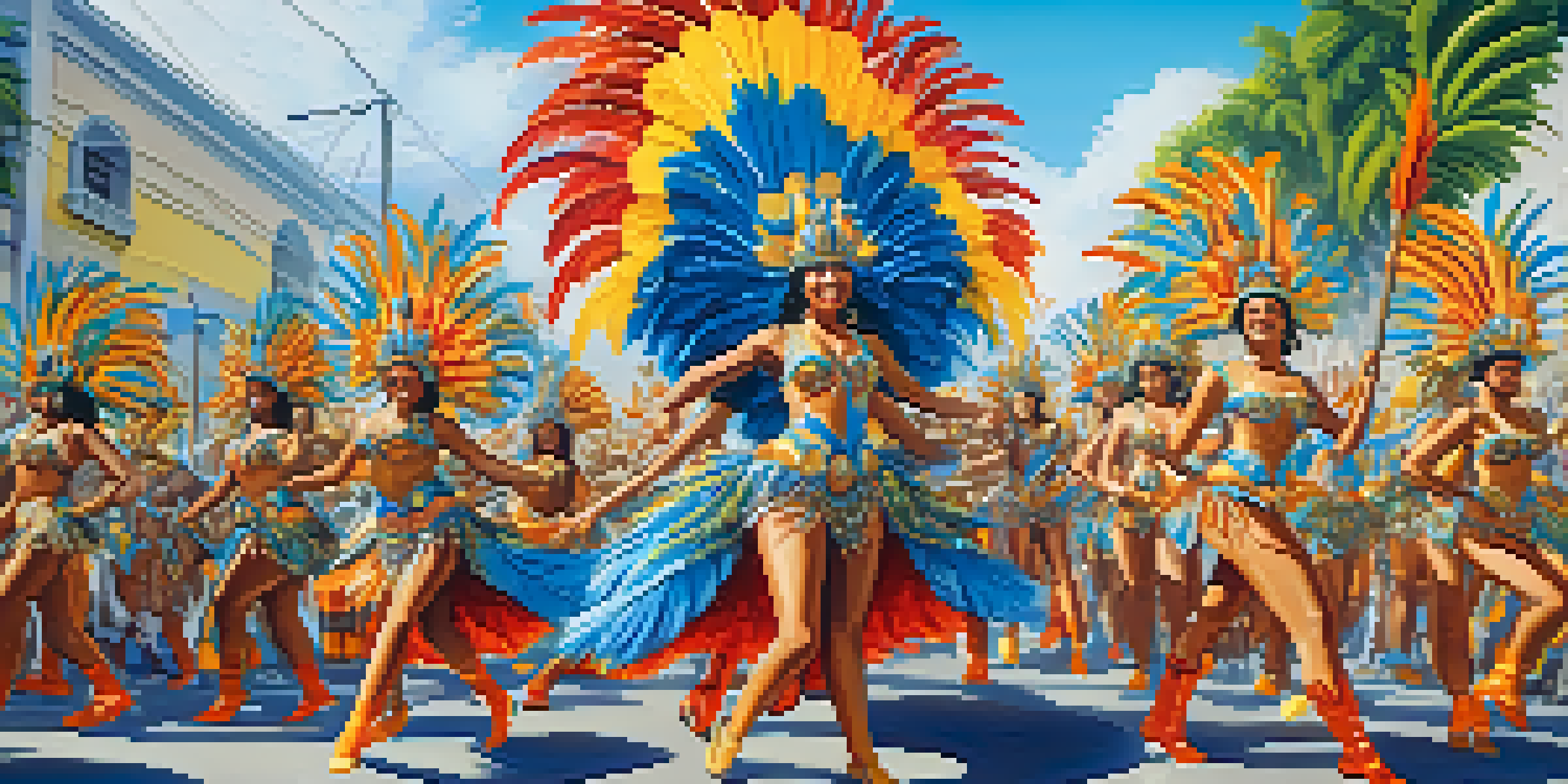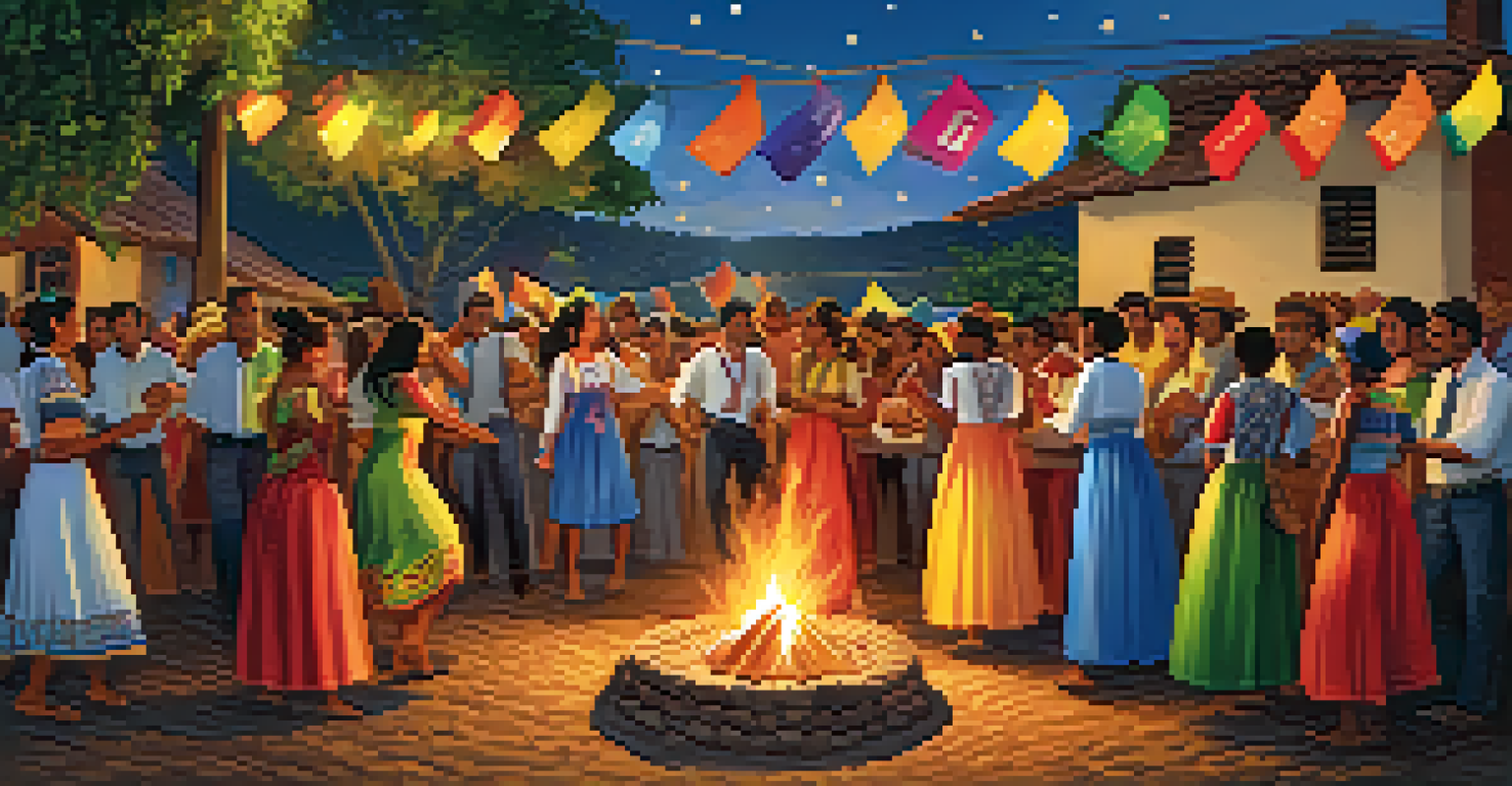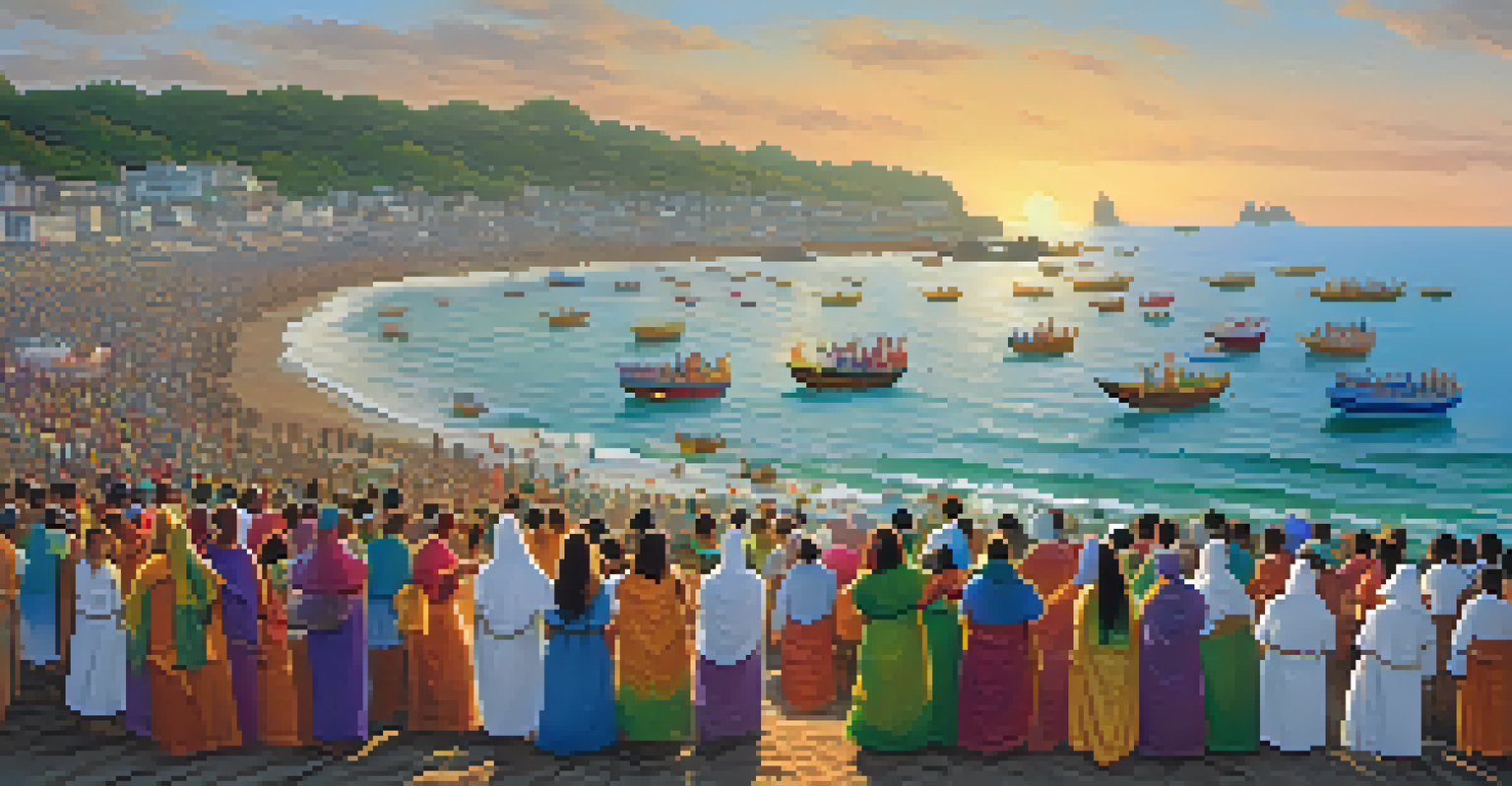Cultural Festivals: Celebrating Brazil's National Identity

The Heartbeat of Brazil: An Introduction to Cultural Festivals
Brazil is renowned for its vibrant cultural festivals, each reflecting the nation's rich tapestry of history, tradition, and diversity. These celebrations are more than just events; they embody the spirit of Brazil, showcasing the unique character of its people. From the rhythmic beats of samba to the colorful parades, festivals serve as a powerful expression of national identity.
Brazil is not just a country, but a world of cultures that celebrates its rich history and diversity through vibrant festivals.
These festivals are often deeply rooted in the local culture and historical narratives, drawing on influences from Indigenous, African, and European backgrounds. For many Brazilians, participating in these events is a way to connect with their heritage and celebrate their unique cultural lineage. Festivals also invite visitors from around the world to experience this kaleidoscope of traditions firsthand.
As we delve deeper into the various festivals of Brazil, we’ll uncover how they not only celebrate local customs but also foster a sense of unity and pride among the citizens. Each festival tells a story, and together they weave a compelling narrative about what it means to be Brazilian.
Carnival: The Grandest Celebration of All
Carnival is undoubtedly the most famous festival in Brazil, attracting millions of participants and spectators every year. This exuberant celebration, held just before Lent, is characterized by vibrant parades, elaborate costumes, and infectious samba music. Cities like Rio de Janeiro and Salvador become epicenters of joy, where streets pulse with energy and creativity.

During Carnival, samba schools engage in fierce competition, showcasing their artistry through dazzling floats and synchronized dance. The preparations for Carnival can take an entire year, emphasizing the dedication and passion of those involved. It’s a time when everyone, regardless of background, comes together to celebrate life and express their cultural pride.
Brazil's Festivals Reflect Diversity
Cultural festivals in Brazil showcase the nation's rich history and diverse influences, bringing communities together in celebration.
Beyond the festivities, Carnival serves as a reminder of Brazil's diverse influences and historical evolution. It’s a celebration that transcends mere spectacle, representing a collective identity built on resilience, joy, and community spirit.
Festa Junina: A Tribute to Rural Heritage
Festa Junina, celebrated in June, is a charming festival that pays homage to Brazil's rural traditions. Originating from the Catholic feast of Saint John, this festival blends folklore with fun, featuring lively quadrilha dances, traditional foods, and colorful decorations. It’s a time when towns and cities come alive with the spirit of the countryside.
Festivals are the heartbeat of a community, bringing people together to celebrate their shared heritage and joy.
Participants often dress in traditional attire, mimicking the rural life of the past. The festival is marked by bonfires, games, and delicious treats like pamonha (corn pudding) and pé-de-moleque (peanut brittle). This celebration reflects a nostalgic appreciation for Brazil's agricultural roots and the simple joys of rural living.
Through its various customs, Festa Junina not only fosters a sense of community but also strengthens ties between generations. It’s a wonderful way for Brazilians to celebrate their cultural heritage while enjoying the warmth of fellowship and festivity.
Parintins Folklore Festival: A Celebration of Legends
The Parintins Folklore Festival, held in the Amazon, is a unique event that showcases Brazil's rich indigenous and folkloric traditions. This festival revolves around the legendary tale of the Boi-Bumbá, a story of rivalry between two folkloric characters, Garantido and Caprichoso. The competition between these two groups captivates audiences with stunning performances and theatrical displays.
What sets this festival apart is its deep connection to the Amazonian culture and environment. Participants immerse themselves in the rich folklore of the region, celebrating not just the story but also the vibrant culture of the Amazonian people. The event also emphasizes the importance of preserving indigenous traditions in the face of modernization.
Carnival: A Unifying Celebration
Carnival stands out as the most famous festival, embodying Brazil's collective identity through vibrant parades and samba music.
Each year, the festival attracts thousands of visitors, eager to witness the magic of the Boi-Bumbá. It's a vivid reminder of how stories and performances can unite people, transcending geographical and cultural boundaries.
Dia de Iemanjá: Honoring the Sea Goddess
Dia de Iemanjá, celebrated on February 2nd, is a beautiful festival dedicated to Iemanjá, the Afro-Brazilian goddess of the sea. This event is especially prominent in coastal cities like Salvador, where thousands gather to pay homage to the goddess through offerings of flowers and gifts. The festival is a fusion of spirituality, tradition, and communal gathering.
As the sun rises, colorful boats line the shores, carrying offerings to the ocean in hopes of receiving blessings for the year ahead. This act of devotion is a striking spectacle, embodying the deep connection between Brazilians and their maritime heritage. The festival becomes a vibrant display of faith, culture, and respect for nature.
Dia de Iemanjá invites participants to reflect on their relationship with the sea, as well as the broader themes of hope and gratitude. It serves as a beautiful testament to Brazil’s diverse religious practices and the importance of honoring one's roots.
Orixás Festival: Celebrating Afro-Brazilian Culture
The Orixás Festival, held in Bahia, is a vibrant celebration of Afro-Brazilian culture, highlighting the rich spiritual traditions brought over by enslaved Africans. This festival honors the orixás, or deities, celebrated in Candomblé, an Afro-Brazilian religious tradition. Through music, dance, and ritual, the festival brings together communities to pay homage to their ancestors and cultural heritage.
During the event, participants engage in lively processions, traditional dances, and offerings to the orixás, creating a deeply immersive experience. The vibrant costumes and rhythmic drumming create an atmosphere of joy and unity, showcasing the richness of Afro-Brazilian traditions. This festival serves as a powerful reminder of the enduring influence of African culture in Brazil.
Cultural Heritage Through Festivities
Festivals like Festa Junina and Dia de Iemanjá honor Brazil’s traditions and foster connections between generations and communities.
The Orixás Festival not only reinforces cultural pride but also fosters understanding and appreciation among diverse communities. It exemplifies how festivals can be a platform for cultural expression, bridging gaps and celebrating the multiplicity of identities within Brazil.
Conclusion: The Essence of Brazil's Cultural Festivals
Brazil's cultural festivals are more than just celebrations; they are vibrant expressions of national identity that unite people from all walks of life. Each festival showcases unique traditions, stories, and customs, reflecting the rich diversity that defines Brazil. From the spirited Carnival to the heartfelt Dia de Iemanjá, these events highlight the importance of community, culture, and heritage.
As we’ve explored, these festivals serve as platforms for cultural expression and preservation, allowing Brazilians to connect with their roots and share their stories with the world. They create opportunities for dialogue, understanding, and celebration among diverse groups, fostering unity in a nation known for its cultural richness.

Ultimately, cultural festivals are a testament to Brazil's dynamic identity, inviting everyone to join in the celebration of life, love, and heritage. By honoring their past, Brazilians continue to shape a vibrant future filled with pride and joy.